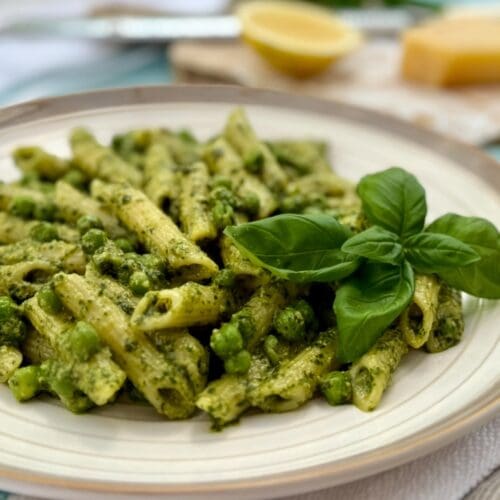
Pea Pesto Pasta with Rocket and Pine Nuts
Bursting with flavours from toasted pine nuts, parmesan, basil, rocket and lemon, this Pea Pesto Pasta is going to knock your socks off!
Video
Ingredients
- 400g / 14oz penne pasta (or pasta of choice) (NOTE 1)
- 2 cups (280g / 9.5oz) frozen or fresh baby peas
FOR THE PESTO
- 4 tbsp (55g / 1.9oz) pine nuts (NOTE 2)
- 50g / 1.8oz basil leaves
- 50g / 1.8oz baby rocket or arugula (NOTE 3)
- 2 large garlic cloves
- 90g / 3oz freshly grated parmesan cheese (extra to serve) (NOTE 4)
- 2 tbsp (40ml / 1.4floz) fresh lemon juice
- ½ tsp salt
- ¼ tsp freshly ground black pepper
- 170ml / 5.7floz olive oil (NOTE 5)
Instructions
- Cook pasta according to the package instructions, usually around 8-10 minutes or until al dente. Stir occasionally to prevent sticking. When the pasta's almost done, scoop 1/4 cup of pasta water and set aside, then add the peas and cook for 1 to 2 minutes or until tender. Drain the pasta and peas using a colander, rinse quickly with cold water, and drain again. Toss the pasta with a small amount of olive oil to prevent them from clumping.
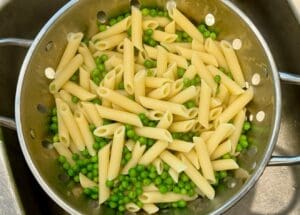
- Toast pine nuts in an unoiled small frying pan over medium-high heat until golden brown and aromatic, then let cool slightly.
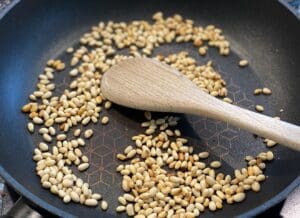
- Combine the pine nuts and all the pesto ingredients (except olive oil) in a food processor. Blitz the ingredients on medium-high until finely chopped, then use a spatula to scrape the sides, and blitz again. Whilst the motor is running at low speed, drizzle the oil through the tube, stop and scrape down the sides if needed. The pesto should be smooth with tiny, visible textures. Taste the pesto and adjust the seasoning and add more lemon juice for extra tang if desired.
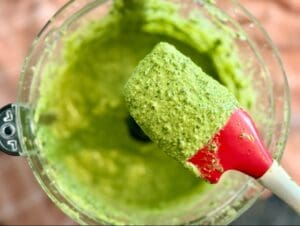
- In a large bowl, combine the pasta, peas, reserved pasta water, and pesto. Toss the pasta and pesto gently until evenly coated. Taste the pasta and add more salt and pepper if needed, then serve with freshly grated parmesan.
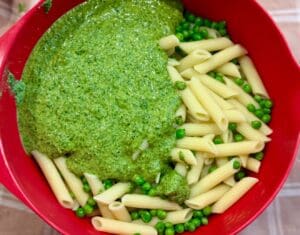
Notes
(NOTE 1) Pasta - I used penne pasta, but any short or long dried pasta of choice would also work.
(NOTE 2) Pine nuts are small edible nuts (technically seeds) found in pine trees. With nutty and buttery flavours, pine nuts are popular in dishes like pesto, salads, and pasta. Supermarkets typically stock pine nuts near the health or nuts section. You could swap pine nuts with chopped cashews.
(NOTE 3) Baby rocket (arugula) - I like to use baby rocket because it's less bitter and won't overwhelm the flavour of the pesto. You could swap rocket with baby spinach.
(NOTE 4) Parmesan cheese - It's worth the effort to grate your own parmesan cheese rather than buying store-bought shredded cheese. Most pre-shredded cheese contains anti-caking agents, which may not blend as nicely into the pesto.
(NOTE 5) Olive oil - I usually opt for milder olive oil in my pesto to let the other flavors shine, as virgin olive oil can be overpowering. This time, I used extra virgin olive oil and didn't mind it at all, so any good quality virgin olive oil will work.
Leftovers - Transfer the pesto into an airtight container and store in fridge for up to 3 days.
I've used a third-party application to calculate the calories and nutritional information, so please use this as an approximate guide only.
Cooking measurements are in Australian standard spoon and cup measurements. For specific details and conversions, visit our Australian Cooking Measurements page.
Nutrition
Serving: 1 ServingCalories: 650kcalCarbohydrates: 71gProtein: 22gFat: 46gSaturated Fat: 8gPolyunsaturated Fat: 8gMonounsaturated Fat: 27gCholesterol: 12mgSodium: 533mgPotassium: 479mgFiber: 7gSugar: 6gVitamin A: 1338IUVitamin C: 29mgCalcium: 283mgIron: 3mg